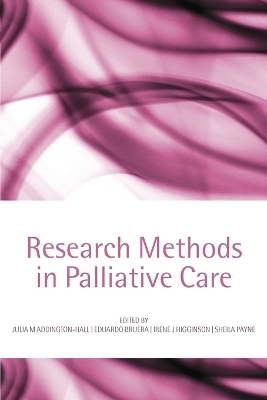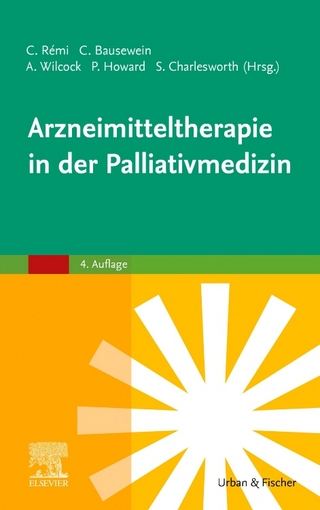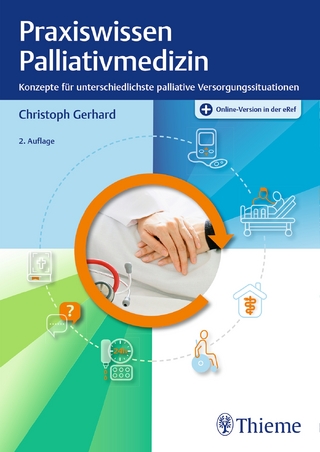
Research methods in palliative care
Oxford University Press (Verlag)
978-0-19-853025-1 (ISBN)
Palliative and end of life care are concerned with the physical, social, psychological and spiritual care of people with advanced disease. It currently has a poorly developed research base, but the need to improve this is increasingly recognised. One of the reasons for the lack of research - and the variable quality of the research that is undertaken - is the difficulty of conducting research with very ill and bereaved people. Standard and well-established research methods may need to be adapted to work in this context. This means that existing research methods textbooks may be of limited use to palliative care practitioners seeking to do research for the first time, or to more experienced researchers wanting to apply their knowledge in palliative care settings.
This research methods textbook is the first to be written specifically for palliative care. It has been edited by four experienced palliative care academics with acknowledged expertise and international reputations in this field. It encompasses methods used in both clinical and health services research in palliative care, with sections on clinical, epidemiological, survey and qualitative research, as well as a section covering skills needed in any research project. Each chapter provides readers with an up to date overview of the research method in question, an understanding of its applicability to palliative care and of the particular challenges of using it in this setting. It is essential reading for all palliative care researchers.
Professor Julia M Addington-Hall joined the School of Nursing and Midwifery, Southampton University as Professor in End of Life Care in 2004. She now heads the Cancer, Palliative and End of Life Care Research Group. Her current research programmes include palliative care beyond cancer (including stroke, heart failure and MND); depression at the end of life; the development and validation of an after-death questionnaire for bereaved people (VOICES), and evaluating health and social care services for people in the last months of life. She is co-Director of the new 'Cancer Experiences Collaborative' (CECo), funded by the UK National Cancer Research Institute. She is Chair of the UK Palliative Care Research Society. She is an editor of the journal 'Palliative Medicine', and a member of the editorial board of 'Journal of Pain and Symptom Control'. She has lectured extensively in the UK and abroad. Dr. Eduardo Bruera currently holds the F.T. McGraw Chair in the Treatment of Cancer and Chair of the Department of Palliative Care and Rehabilitation Medicine. He previously worked at the University of Alberta, helping to develop the Division of Palliative Care Medicine and the Edmonton Regional Palliative Care Program. Among his research interests are cancer pain, cachexia, fatigue, delirium, communication, and outcomes research in palliative care. He has a strong interest in the global development of palliative care and has collaborated for many years with the World Health Organization/Pan American Health Organization and served as Chair of the International Association of Hospice and Palliative Care (IAHPC) between 2000 and 2004. In addition to having published more than 700 papers, abstracts, and book chapters, Dr. Bruera has trained hundreds of physicians who are currently practicing palliative care around the world. Professor Irene Higginson is particularly known for her development of methods to assess the quality and outcomes of palliative care, evaluation of treatments and epidemiologically based assessment of problems and need in cancer and non-cancer. She has developed undergraduate and postgraduate education programmes for doctors, nurses and other professions, including a multi-professional Masters programme for the leaders in palliative care for the future. Irene Higginson has published widely on palliative care, quality of life measurement, and evaluation of services and therapies, in scientific journals and in textbooks. She has developed and validated two tools used widely in the UK and many other countries to help in the assessment of patients and families and in the quality of care, led the evidence review for the NICE guidance on Supportive and Palliative Care, and the WHO new guidance on Better Palliative Care for Older People. Professor Sheila Payne is a health psychologist with a background in nursing. She holds the Help the Hospices Chair in Hospice Studies based at the Institute of Health Research and works in collaboration with the International Observatory on End of Life Care at Lancaster University. Professor Payne has a long track record in palliative care research and scholarship. She previously led the Palliative and End-of-Life Care Research Group at the University of Sheffield. Her research agenda focuses on palliative and end-of-life care for older people and bereavement support. She holds a number of major grants in these areas and supervises PhD students. She co-directs the NCRI funded Cancer Experiences Collaborative with Professor Addington-Hall. Sheila has published widely in academic and professional journals, written ten books, and edits the 'Health Psychology' book series published by the Open University Press with Sandra Horn.
1. Introduction ; SECTION 1 - CLINICAL TRIALS ; 2. Principles of designing clinical trials in palliative care ; 3. Ethical and practical issues in designing and conducting clinical trials in palliative care ; SECTION 2 - SURVEY RESEARCH ; 4. Survey design ; 5. Survey research: methods of data collection, questionnaire design, and piloting ; SECTION 3 - EPIDEMIOLOGICAL RESEARCH METHODS ; 6. Experimental and quasi-experimental designs ; 7. Outcome measurement ; 8. Systematic reviews ; SECTION 4 - QUALITATIVE RESEARCH METHODS ; 9. Qualitative methods of data collection and analysis ; 10. Ethical and practice issues in qualitative research ; 11. Evaluating qualitative research ; 12. Mixed methods for evaluation research ; 13. Ethnography ; 14. Documentary analysis and policy ; SECTION 5 - HOW TO... ; 15. How to develop a research question ; 16. Writing a research proposal ; 17. How to gain research ethics approval ; 18. How to use a statistician ; 19. How to write a paper
| Erscheint lt. Verlag | 7.6.2007 |
|---|---|
| Zusatzinfo | 3 black and white line illustrations |
| Verlagsort | Oxford |
| Sprache | englisch |
| Maße | 155 x 233 mm |
| Gewicht | 489 g |
| Themenwelt | Medizin / Pharmazie ► Medizinische Fachgebiete ► Palliativmedizin |
| ISBN-10 | 0-19-853025-0 / 0198530250 |
| ISBN-13 | 978-0-19-853025-1 / 9780198530251 |
| Zustand | Neuware |
| Haben Sie eine Frage zum Produkt? |
aus dem Bereich


